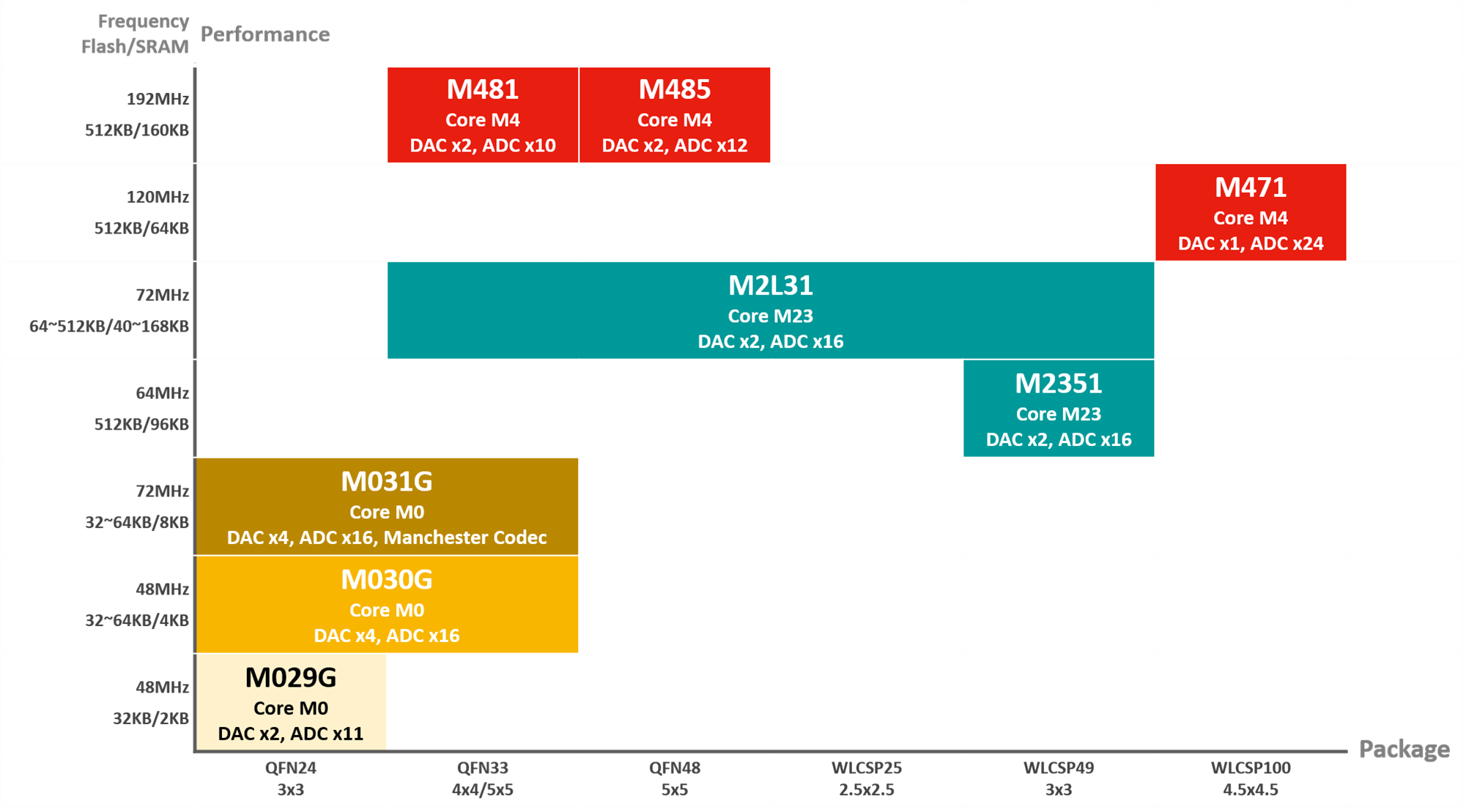Arm Cortex-M4 MCU for High-Speed Optical Module Applications
With the rapid development of 5G, AI, IoT, cloud computing, and autonomous driving technologies, optical communication is entering a phase of upgrading. Particularly with the booming AI and cloud computing industries, the demand for high-speed optical modules, such as 100G, 400G, and 800G, is growing exponentially. According to Lightcounting’s forecast, the global optical module market is expected to continue expanding at a compound annual growth rate (CAGR) of 11% from 2023 to 2027. From an application perspective, AI optical modules are becoming a major driving force behind the growth of the optical module market.
Nuvoton Technology has launched the M4-based microcontrollers designed for high-speed optical module applications, including the M471CI8AE and M485YIDAE. These microcontrollers provide high performance, low power consumption, and a wide range of peripheral features to meet the needs of optical module systems.
NuMicro® M471CI8AE Microcontroller
The M471CI8AE is based on the Arm® Cortex®-M4F core, which supports DSP instructions and a single-precision floating-point unit (FPU) for enhanced data processing capabilities. It integrates 512KB dual-bank Flash, supporting FOTA (Firmware Over-The-Air) for easy remote updates. The microcontroller also features 64 KB SRAM and 32 KB Data Flash for storing parameters.
The M471CI8AE supports multiple peripherals, including a 24-channel 12-bit SAR ADC, 1 8-bit DAC channel, 2 sets of analog comparators, 2 sets of SPI/I²S, 2 sets of I²C, and up to 24 channels of 16-bit PWM, as well as 6 sets of UART. The microcontroller operates at a frequency of up to 120 MHz and supports a wide operating voltage range of 2.5V to 5.5V, with an operating temperature range of -40°C to 105°C. It comes in a compact WLCSP100 (4.5x4.5mm) package.
Key Features:
|
Function |
M471CI8AE |
Note |
|
Core |
120MHz Cortex-M4 |
|
|
Flash |
512k |
|
|
Data Flash |
32k |
|
|
SRAM |
64k |
|
|
DMA |
6ch |
|
|
I2C |
Up to 2 set of I2C |
|
|
SPI |
Up to 2 set of SPI |
|
|
UART |
Up to 6 set of UART |
|
|
Timer |
4 set |
|
|
PWM |
Up to 24ch PWM |
|
|
ADC |
Up to 24ch, 12bit, 1.8MSPS, ADC |
|
|
DAC |
1 set of 8bit DAC |
|
|
Comparator |
Up to 2 set of Comparator |
|
|
GPIO |
Up to 91 |
|
|
Operate Temp. |
-40℃ ~ 105℃ |
|
|
package |
WLCSP100 |
|
NuMicro® M485YIDAE Microcontroller
The M485YIDAE is also based on the Arm® Cortex®-M4F core, with DSP instruction support and a single-precision floating-point unit (FPU). It operates at a maximum frequency of 192 MHz, with a low dynamic operating power consumption of only 175 µA/MHz. The microcontroller integrates 512KB dual-bank Flash, supporting Firmware Over-the-Air (FOTA), and includes 160KB SRAM, including a 32KB Cache for accelerated external SPI Flash access, enabling execute-in-place execution.
The M485YIDAE also features Secure Boot functionality to perform integrity checks on the internal Flash program, along with a Secure Protection ROM for storing sensitive code or data. Additionally, it includes an OTP (One-Time Programmable) ROM block for managing the product lifecycle.
The M485YIDAE supports multiple peripherals, including a 16-channel 12-bit SAR ADC, 2 channels of 12-bit DAC, 2 analog comparators, 3 sets of SPI, 3 sets of I²C, up to 24 channels of 16-bit PWM, and 6 sets of UART. It operates in a voltage range from 1.8V to 3.6V and has an operating temperature range of -40°C to 105°C. The microcontroller comes in a QFN48 (5x5mm) package.
Key Features:
|
Function |
M485YIDAE |
Note |
|
Core |
192MHz Cortex-M4 |
|
|
Flash |
512k |
|
|
SRAM |
160k |
|
|
DMA |
16ch |
|
|
Crypto |
Yes |
|
|
USB |
FS OTG |
|
|
I2C |
Up to 3 set of I2C |
|
|
SPI |
Up to 3 set of SPI |
|
|
UART |
Up to 6 set of UART |
|
|
Timer |
4 set |
|
|
PWM |
Up to 24ch PWM |
|
|
ADC |
Up to 16ch, 12bit, 5MSPS, ADC |
|
|
DAC |
Up to 2 set of 12bit DAC |
|
|
Comparator |
Up to 2 set of Comparator |
|
|
GPIO |
Up to 41 |
|
|
Operate Temp. |
-40℃ ~ 105℃ |
|
|
package |
QFN48 |
|
Nuvoton Optical Module MCU Product Portfolio
Nuvoton offers a comprehensive range of microcontrollers designed for optical module applications, encompassing M0, M23, and M4 core products.

 粤公网安备 44030502010001号
粤公网安备 44030502010001号